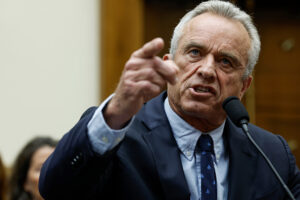When Robert F. Kennedy Jr revealed that his running mate for the presidency was Nicole Shanahan, ex-wife of Google co-founder Sergei Brin, there was much wailing and gnashing of teeth from the usual suspects. Although Shanahan is successful in her own right (she founded her own patent analytics company in 2013, five years before she married Brin) the fact that someone with such close ties to the Silicon Valley elite was joining the Kennedy apostate in his Quixotic campaign was regarded by many as a betrayal of the progressive ethos of Silicon Valley. The fact that it was announced in Oakland, less than 10 miles away from San Francisco, only added insult to injury: it was like a direct assault on the citadel.
But Shanahan is only one of several wealthy Silicon Valley insiders to support Kennedy. Last June, when Kennedy was still a member of the Democratic Party, Twitter co-founder and former CEO Jack Dorsey (net worth: $4.9 billion) gave his endorsement, praising him for having “no fear in exploring topics that are a little bit controversial”. Meanwhile the venture capitalists David Sacks and Chamath Palihapitiya have also contributed to RFK’s campaign, while Elon Musk hosted Kennedy for a two-and-a-half-hour long conversation on Twitter last year.
This is a far cry from the heady days of the Obama presidency, when there was a revolving door between tech firms and the administration. I still remember the Google all-hands meeting that was leaked online in the aftermath of Trump election, where the company’s CFO cried as Brin explained to his employees that some people were just “low information voters”. And although the relationship between tech firms and the Democrats has grown more strained since those days, most political donations continue to go in one direction, while those who are Kennedy curious are denounced as reactionaries, and constantly reminded of his anti-vaccine stance and conspiratorial statements .
But although Silicon Valley may have been largely absorbed into a monolithic political orthodoxy, this has distracted us from the quintessential strangeness of the region — that for decades it was a place where you could really let your freak flag fly. Far from an aberration, in many ways RFK constitutes the ideal Silicon Candidate, personifying a turbulence and weirdness that goes back to the very dawn of the valley.
The USA’s technology industry was not originally centred on the west coast. Univac, the first commercial computer was developed in the east, while IBM, dominant in the industry for many decades, was (and is) headquartered in New York state. The man who put the “silicon” in Silicon Valley was William Shockley, one of the inventors of the transistor. Shockley founded his own company in Mountain View in the mid-Fifties, attracting some of the best and brightest to move there; when they discovered he was a terrible manager, some went on to start their own companies. But besides being a brilliant scientist, Shockley was also a rampant racist and enthusiastic eugenicist decades after such ideas were regarded as being beyond the pale. While the battle for civil rights was raging, he argued for the sterilisation of black women, and in his 70s donated his sperm to a depository of semen collected from Nobel Prize winners. When interviewed by Playboy he complained that his children represented a “very significant regression” due to the lower intellectual capabilities of their mother.
Compared to the positions held by the father of Silicon Valley, then, RFK’s much criticised anti-vaccine stance is exceedingly mild as far as controversial ideas go. Meanwhile, as much as he is attacked by the media and members of his former party, it was not so long ago that some progressives didn’t mind a bit of anti-vax rhetoric. The Huffington Post was home to many articles by vaccine sceptics (including RFK himself) until they were memory-holed during the pandemic. Similarly, one of the great idols of Silicon Valley, Steve Jobs, was sufficiently doubtful about medical science that when he was diagnosed with pancreatic cancer, he opted to treat it with acupuncture, a lot of fruit juice and “spiritual consultations”. And a critical attitude towards multinational pharmaceutical companies would have been completely uncontroversial on the Left until a few short years ago. We should not be surprised therefore if some in Silicon Valley aren’t too bothered about RFK’s attitude towards vaccines.
But there are plenty of other reasons why Kennedy might appeal to some of the more unorthodox thinkers in Silicon Valley. Although Jack Dorsey ended his tenure at Twitter by banning Trump from the platform, he too is a strange guy with a big beard and a collection of psychedelic T-shirts who celebrated his 42nd birthday by going to Myanmar to meditate for 17 hours a day. Dorsey has been searching for alternatives to the dreary offerings of establishment Democrats for years, having previously donated money to the apostates Andrew Yang and Tulsi Gabbard. And he is also a cryptocurrency enthusiast, and was likely impressed by the keynote speech RFK delivered at a Bitcoin conference in Miami last year, in which he described it as “the perfect base currency.”
David Sacks, meanwhile, is part of the so-called “PayPal mafia” that includes Silicon Valley dissidents Elon Musk and Peter Thiel. Sacks has never been shy about holding dissenting opinions to the tech mainstream. At the tender age of 23 he co-authored with Thiel a book entitled The Diversity Myth, where he argued that many academic and cultural institutions were using “diversity” as cover for repression and a general stifling of intellectual culture. Like RFK, he is a strong advocate for free speech, and sceptical of the war on Ukraine. Although both positions are now supposed to be Right-wing, it was of course completely standard on the Left to be anti-war and for freedom of expression until very recently. And as for Chamath Palihapitiya (who co-hosts a podcast with Sacks) he has previously donated a lot of money to the Democratic Party, but has also thrown a few dollars Ted Cruz’s way and supported Michael Bloomberg for president, while also hosting a fundraiser for Vivek Ramaswamy. Clearly this is a man no longer wedded to the status quo, but open to alternatives.
Of course, RFK isn’t going to win, so it might seem strange that a bunch of canny venture capitalists would throw away so much money on a lost cause. But wealthy people throw money away all the time, and for much less entertaining reasons. Nikki Haley burned enormous amounts of donor cash as she waged her futile campaign against Donald Trump, while in the US it is considered entirely upstanding for a rich person to donate huge sums of money to already extremely wealthy institutions such as Harvard or Yale. And what is a couple of million dollars compared to the strange phenomenon witnessed in the UK, whereby people dedicate their entire lives to supporting a political party that hasn’t won a majority at an election in over a century? Who knows what lurks in the human heart — maybe David Steel and Paddy Ashdown and Charles Kennedy all believed that they would pull off a revolution. Perhaps Nicole Shanahan believes that with the Kennedy name and her cash, they may be able to beat the system.
But equally perhaps it’s not about winning at all. RFK is sometimes described as a “chaos agent” and much of the bitterness aimed at him is fuelled by the fear that he will take away enough of Biden’s vote to let Trump back in. But rather than anything quite so anarchic, he represents a value that was once regarded as the highest virtue in Silicon Valley: disruption. In our newly tech-pessimist era, the internet is now awash in articles denouncing this as a dangerous buzzword at best and a delusion at worst. But there was a time not so long ago when venture capitalists and their media stenographers were constantly looking for the visionary with the radical idea that would upend old ways of doing things. AirBnB, Uber, WeWork were all once feted as disruptors to the markets they entered (some admittedly more successful than others).
From one angle this is exactly what RFK looks like: he has liberated himself from the dreary groupthink of his party, even the confines of his family. He says what he thinks and has created a platform with appeal to some on the Right, some on the Left and some who refuse to identify with either side. But beyond that, he is different from a conventional disruptor because there is no gamble involved: whatever capital is expended on him will definitely go up in smoke. In which case, the strategy must be to expand the realm of what it is possible to say, and to give a bloody nose to a party run by a detached elite that has embraced a whole new set of shibboleths, and yet which still demands fealty. Or maybe it doesn’t matter too much what RFK stands for, and when billionaires donate to his campaign it is fundamentally an existential act, burning money as a giant F.U. to people they despise. And if you can afford to do it, then is it really such terrible value for money?
Disclaimer
Some of the posts we share are controversial and we do not necessarily agree with them in the whole extend. Sometimes we agree with the content or part of it but we do not agree with the narration or language. Nevertheless we find them somehow interesting, valuable and/or informative or we share them, because we strongly believe in freedom of speech, free press and journalism. We strongly encourage you to have a critical approach to all the content, do your own research and analysis to build your own opinion.
We would be glad to have your feedback.
Source: UnHerd Read the original article here: https://unherd.com/



